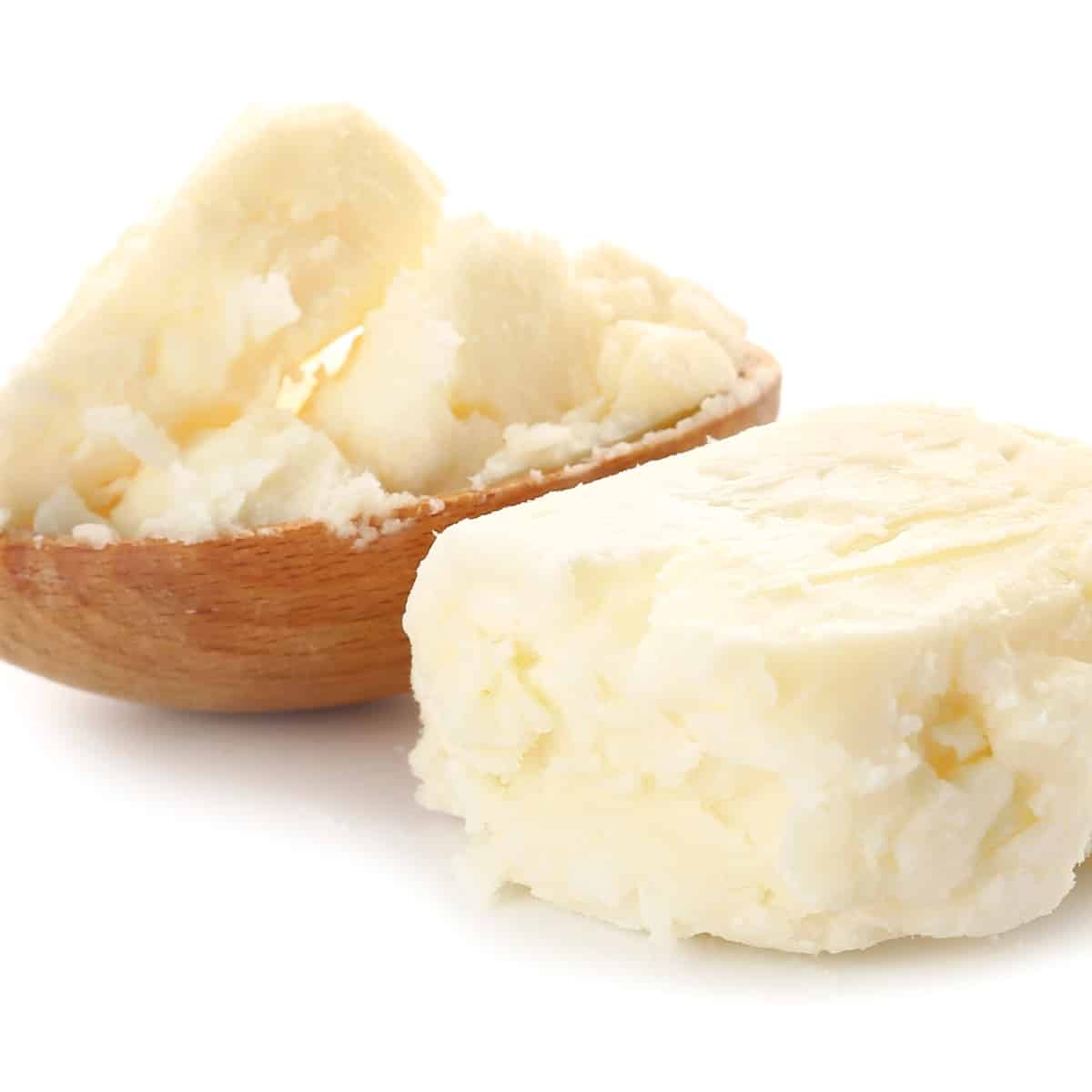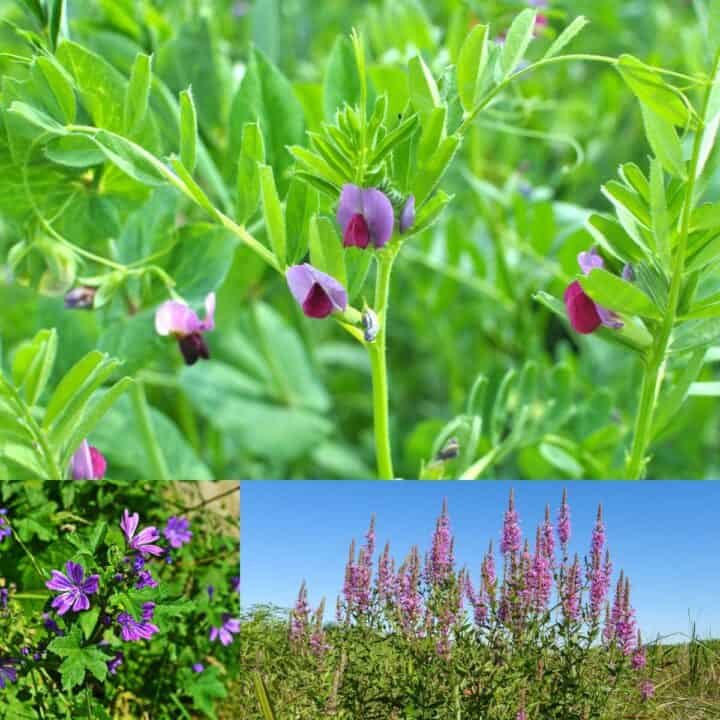Ever wonder about shea butter vs mango butter? Wonder no longer! While both are natural plant-based butters with moisturizing properties, they have some distinct differences that set them apart.

Jump to:
When it comes to natural skincare ingredients, shea butter, and mango butter are two of the most popular options available. Both of these natural butters are well-known for their moisturizing and nourishing properties, and they are often used in a variety of skincare products, from body butters and lotions to lip balms and hair masks. While both shea butter and mango butter offer many benefits for the skin, they are different in several ways. In this article, we will compare shea butter vs mango butter to help you determine which one is right for you.

What is Shea Butter?
Shea butter is a fat extracted from the nuts of the shea tree, which is native to West Africa. Shea butter has been used for centuries in African skincare and has gained popularity worldwide in recent years. Shea butter is rich in vitamins A, E, and F, as well as fatty acids, which help to nourish and protect the skin. Shea butter is known for its moisturizing and healing properties, making it an excellent choice for dry, damaged, or sensitive skin.
Shea butter is a semi-solid butter that melts at body temperature, making it easy to apply to the skin. It has a slightly nutty aroma and a creamy texture that feels luxurious on the skin. Shea butter is also non-comedogenic, which means that it won't clog pores or cause breakouts, making it suitable for use on all skin types.

What is Mango Butter?
Mango butter is a fat extracted from the kernels of the mango fruit. It is rich in antioxidants, minerals, vitamins, magnesium, potassium, and fatty acids, which make it an excellent ingredient for skincare. Mango butter is known for its moisturizing and emollient properties, which help to soothe and nourish the skin. Mango butter is often used in skincare products to help improve the texture and appearance of the skin, as well as to promote skin elasticity and minimize the appearance of wrinkles and stretch marks.
Mango butter is a semi-solid butter that has a similar consistency to shea butter. It has a slightly sweet aroma and a smooth texture that melts into the skin easily. Like shea butter, mango butter is non-comedogenic, making it safe for use on all skin types.
Shea Butter vs Mango Butter: Differences
While shea butter and mango butter share many similarities, there are some key differences between the two. Here are a few of the main differences between shea butter and mango butter:
- Nutrient Composition
Shea butter is rich in vitamins A, E, and F, as well as fatty acids. Vitamin A is important for healthy skin cell production, while vitamin E helps to protect the skin from free radicals that can cause damage. Fatty acids help to nourish and protect the skin, keeping it hydrated and healthy.
Mango butter is also rich in vitamins and fatty acids, but it contains a higher percentage of oleic acid, which makes it more moisturizing than shea butter. Oleic acid is a type of monounsaturated fatty acid that is found in high concentrations in certain foods, such as olive oil and avocados. It is known for its ability to penetrate deeply into the skin, helping to hydrate and nourish it from the inside out.
- Texture and Consistency
While both shea butter and mango butter have a similar texture and consistency, there are some differences between the two. Shea butter has a slightly grainy texture, which can be a bit rough when applied to the skin. Mango butter, on the other hand, has a smooth and creamy texture that feels luxurious on the skin.
- Scent
Shea butter has a slightly nutty aroma, which some people find pleasant, while others find it a bit overpowering. Mango butter, on the other hand, has a sweet and fruity odor that many people find pleasant and refreshing.
- Absorption Rate
Another key difference between shea butter and mango butter is their absorption rate. Shea butter is a bit slower to absorb into the skin, which can leave a slightly greasy residue on the surface. Mango butter, on the other hand, absorbs quickly into the skin, leaving it feeling soft and smooth without any greasiness.
- Skin Type Suitability
While both shea butter and mango butter are safe for use on all skin types, they may be more suitable for certain skin types than others. Shea butter is an excellent choice for dry, sensitive, or mature skin, as it helps to hydrate and nourish the skin, promoting a healthy, youthful appearance. Mango butter, on the other hand, is ideal for oily or acne-prone skin, as it has a lighter texture and a higher absorption rate, which can help to prevent clogged pores and breakouts.

Uses of Shea Butter
Shea butter is a versatile ingredient that can be used in a variety of skincare products. Here are a few of the most popular uses of shea butter:
- Moisturizer: Shea butter is an excellent moisturizer for dry or damaged skin. It helps to hydrate dry skin and nourish the skin, leaving it feeling soft and smooth.
- Anti-inflammatory: Shea butter has anti-inflammatory properties, which can help to soothe and calm irritated skin. It is often used to treat skin irritations like eczema and psoriasis.
- Anti-aging: Shea butter is rich in antioxidants, which help to protect the skin from free radicals that can cause damage and also encourages collagen production. It also contains vitamin A, which is important for healthy skin cell production, and vitamin E, which helps to prevent premature aging and minimize the appearance of fine lines and scarring.
- Hair conditioner: Shea butter can be used as a natural hair conditioner, helping to nourish and hydrate the hair, leaving it looking shiny and healthy.
Uses of Mango Butter
Mango butter is also a versatile ingredient that can be used in a variety of skincare products. Here are a few of the most popular uses of mango butter:
- Moisturizer: Mango butter is an excellent moisturizer for all skin types, but especially for oily or acne-prone skin. It helps to hydrate and nourish the skin without leaving a greasy residue.
- Anti-aging: Mango butter is rich in antioxidants, which help to protect the skin from free radicals that can cause damage. It also contains vitamin A, which is important for healthy skin cell production, and fatty acids, which help to improve skin elasticity and firmness.
- Hair conditioner: Mango butter can also be used as a natural hair conditioner, helping to hydrate the hair, leaving it looking healthy and glossy.
- Healing: Mango butter has healing properties, which can help to soothe and heal damaged or irritated skin. It is often used to treat conditions like sunburn, insect bites, and rashes.

Which One is Better?
When it comes to choosing between shea butter and mango butter, there is no one-size-fits-all answer. Both of these natural butters offer many benefits for the skin and can be used in a variety of skincare products. The choice between shea butter and mango butter ultimately comes down to personal preference and skin type.
If you have dry, sensitive, or mature skin, shea butter may be the better choice for you. Its rich, nourishing properties help to hydrate and protect the skin, leaving it looking healthy and youthful. If you have oily or acne-prone skin, mango butter may be the better choice for you. Its lighter texture and higher absorption rate can help to prevent clogged pores and breakouts, while still providing essential moisture and nourishment.
Both shea butter and mango butter are excellent choices for anyone who wants to use natural, plant-based ingredients in their skincare routine. They are both rich in nutrients and offer many benefits for the skin, including hydration, nourishment, and protection.
When shopping for shea butter or mango butter, it's important to choose a high-quality product that is free from additives and other harmful chemicals. Look for products that are organic and sustainably sourced, as this will ensure that you are getting the best possible product for your skin and the environment.
It's also worth noting that shea butter and mango butter can be used together in the same skincare routine and incorporated into DIY skincare products. By combining the benefits of these two natural butters, you can create a rich, nourishing formula that is perfect for all skin types.
Recipes Incorporating Mango Butter or Shea Butter
In Conclusion
In conclusion, both shea butter and mango butter are excellent natural ingredients for skincare. They each have their unique properties and benefits, and the choice between them comes down to personal preference. Whether you choose shea butter, mango butter, or a combination of the two, you can rest assured that you are using a safe and effective ingredient that will leave your skin looking and feeling its best.








William McCullough says
Nilotica butter is absolutely the best oil and butter (melt). Also kokum and murumuru are better than mango and shea butter. I can only find them on OK organics and essentials website.
SALISU SHEHU U. says
The are excellent and nourishing, but as SHEA BUTTER are use in cooking,can MANGO BUTTER be use in cooking as well? Your research is marvelously interesting.